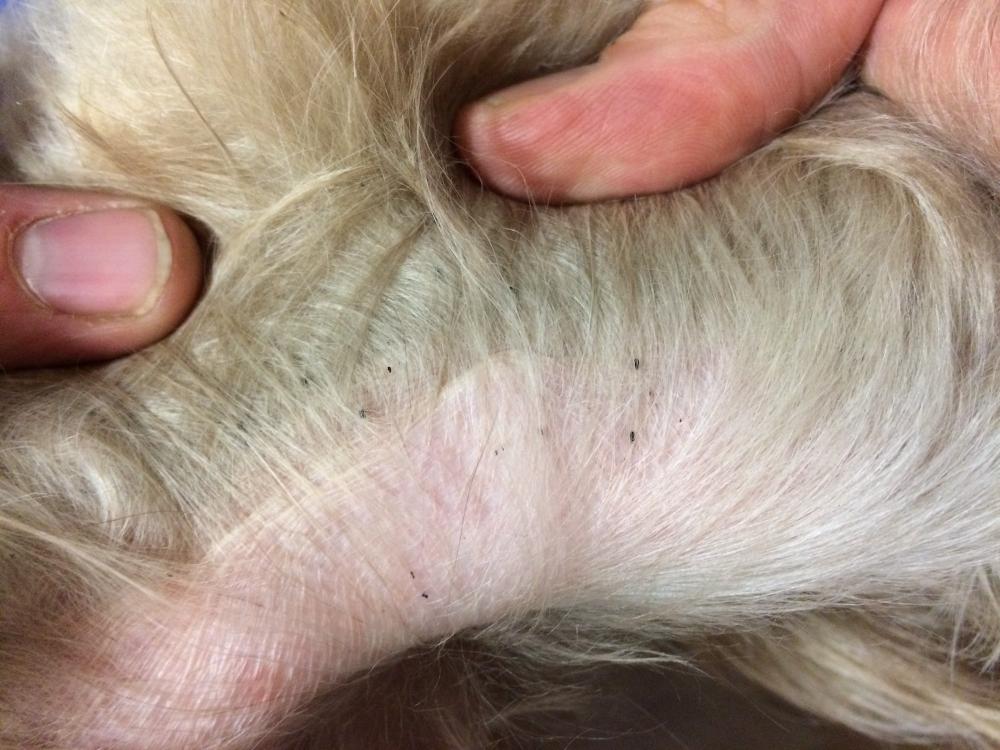
Intestinal worms in dogs
- Four types of intestinal worms pose a risk to dogs in the UK
- The most serious is roundworm but hookworms, whipworm and tapeworms are also found
- Dogs can be infected with worms through their mother or by contaminated soil
- If left untreated, worms can lead to serious health complications
- Humans can contract certain worms from dogs, although cases are rare
- To prevent worms spreading, it’s crucial that dog owners pick up their pet’s mess
What are the different types of intestinal worms in dogs?
There are four common types of intestinal worms in dogs, they are: roundworms, hookworms, whipworms and tapeworms. The symptoms of each type of worm vary, as does the way in which dogs can be infected.
Roundworm in dogs
There are two species of roundworm which can affect dogs, toxocara canis and toxascaris leonin. Both are long, white and spaghetti-like in appearance and absorb nutrients from the infected dog.
Roundworm larvae will initially infect a dog’s intestinal tract, but can burrow their way into other bodily tissues and organs. As toxocara canis larvae mature, they will move onto the lungs to develop and then then up to the airway before being coughed up and swallowed again, re-entering the intestine to complete their lifecycle. Toxascaris leonina do not move around the body and have a far simpler lifecycle.
Hookworm in dogs
Hookworms are short, blood sucking parasites with teeth. They can be fatal in young puppies, due to the amount of nutrients they strip from the dog. They are not common in the UK but they are present in Europe. Hookworms have a very similar lifecycle to the toxocara canis roundworm, moving about the body and into the lungs to mature before re-entering the intestine.
Whipworms in dogs
Whipworms live in the large intestine and don’t extract as many nutrients as other types of worms. Unless the worms burrow into the intestinal tissue, they pose few problems and rarely cause symptoms. They do occur in the UK but aren’t common.
Tapeworm in dogs
Tapeworms live in the small intestine, grabbing on to its wall with six tiny rows of teeth to absorb nutrients as food is digested. They are long – half a foot or more in length – and flat in appearance. Unless the dog is extremely active, the parasite does not harm the pet, as there are plenty of nutrients to serve both host and tapeworm. When excreted, the worm normally splits into segments which look like small grains of rice.
Lungworm advice for dog owners
Although not an intestinal worm, lungworm is fairly common in the UK and can cause serious disease or even kill. Ask your vet about how to prevent it as many common worming treatments aren’t effective. Read more about this particular type of worm in our Lungworm advice for dog owners

How can dogs and puppies catch intestinal worms?
From their mother
Both roundworms and hookworms can penetrate the uterus and can therefore be transmitted to unborn puppies, as well as to young puppies through their mother’s milk. This is a very common route of infection for roundworm and so it’s extremely important to ask your vet’s advice about worming puppies.
Ingesting contaminated soil
Another major source of infection of roundworms, hookworms and whipworms for dogs is through contaminated soil because the parasites live in the gut and shed eggs in the faeces. It can take anything up to a month for the larvae to become active and eggs can remain a threat for a number of years, so there is often no trace of the faeces which has contaminated the soil. Dogs usually become infected while grooming themselves and consuming contaminated dirt in their fur. It is therefore crucial that dog owners always clean up after their pets.
Walking on contaminated soil
Only hookworms can be contracted in this way. The parasites can penetrate any part of the dog’s skin that touches infected soil, such as the paws or belly.
Eating other infected animals
Roundworms, hookworms, tapeworms and whipworms can all be contracted by eating an infected animal, such as a rodent, which can catch worms in the same way dogs can. A serious form of tapeworm (Echinococcus) is present in some areas in the UK (Wales and the Welsh borders) and can be contracted if dogs scavenge off the carcases of dead domestic animals such as sheep. Raw dog food can therefore also pose a risk for the same reasons.
Fleas
Tapeworms are the only intestinal parasite that can be passed on through infected fleas and cannot be contracted in any other way. A dog will only be infected if it consumes a flea carrying tapeworm eggs.
What are the symptoms of intestinal worms in dogs?
Roundworms usually don’t cause illness although they can sometimes make dogs very ill. Tapeworms, hookworms and whipworms are less of a health threat unless present in large numbers. Most dogs will present none or few symptoms, but they can sometimes include:
- Diarrhoea
- Vomiting
- Swollen abdomen
- Lethargy
- Nutritional deficiencies
- Dehydration
- Cough (normally only seen in roundworm and hookworm infections)
- Blocked intestine (only in severe cases infestations)
- Pneumonia (only seen in serious cases of roundworm)
How can I tell if my dog has intestinal worms?
Adult worms – apart from tapeworms - are rarely seen so you cannot tell if your dog has worms just by looking. The only way to know is by microscopic examination of the faeces to detect the eggs. This is why prevention is so important.
Can I catch worms from my dog?
Yes, humans can catch roundworms, hookworms and whipworms from dogs but it’s unusual. Like their pets, people can be infected through contaminated soil. In theory, tapeworms can also be contracted by inadvertently eating an infected flea, although only a handful of cases have ever been reported.
Roundworms are the most common parasite to be passed on from dogs to humans, and cases are more prevalent among children. Both species of the worm can infect people and lead to a condition called toxocariasis. While most present no symptoms and the parasites die within a few months, some people will experience a mild cough, fever, headaches or stomach cramps. In very rare cases the roundworm larvae can infect organs such as the liver, lungs, eyes or brain and cause much more severe symptoms.
More information on how intestinal worms can affect humans can be found on the NHS website. You can reduce the risk of infection by worming your dog regularly and by good hygiene such as washing your hands after handling pets and before eating.
Can dog worms infect cats in the household?
Only one type of roundworm - toxascaris leonina - can infect cats, and it is the least common of the two. While the same medication in dogs can treat both types, determining which type of roundworm your dog has is therefore important if he or she also shares their home with felines.
Hookworms, tapeworms and whipworms can also be passed between dogs and cats. Read more about internal parasites in cats.

What treatments for worms in dogs are available?
It’s essential that you give your dog regular de-worming treatment, especially if you have children. Puppies are particularly high risk as they can have high levels of infection.
Always consult your vet on the best treatment for your dog. There are numerous types of deworming medication available which prevent and treat some or all types of intestinal parasites together. These can be administered by injection, tablet, or through spot-on treatments. In the case of pet shop products, check you are giving the correct dose for your dog’s body weight and check which type of worm is controlled by each treatment. Effective flea prevention treatment should also stop your dog from contracting tapeworms.
Specific medication may be required to prevent mothers from passing worms onto their young as routine deworming is not always adequate. Talk to your vet about this.
A single treatment often won’t completely get rid of all worms in your pet’s body. In cases of toxocara canis roundworms and hookworms, fresh larvae can enter the intestine after deworming – so repeat treatment will be necessary to cure the infection. You often won’t see dead worms in the stool (they can be digested!). Many worming medications are still effective even if your dog vomits after a tablet has been given – check with your vet whether an additional dose is needed.
Bear in mind that dogs can also become infected with worms that live in the heart or lungs which require different medication. Some types of lungworm are common in some areas of the UK, and dogs which eat slugs or snails are especially prone. Special treatments are available; so ask your vet whether treatment is needed in your area.
If you take your dog abroad, follow the DEFRA recommendations, and check with your vet about any other disease threats in the area you are visiting.
How often should I worm my dog?
Puppies need worming regularly, often until they are six months old – ask your vet’s advice on how best to use their products. Adult dogs need worming at least four times a year, or more frequently if there are young children in the household. Females also need worming when they are pregnant, feeding pups or 30 days after a season. Always ask for your vet’s advice on worming and frequency.
It’s also important to always clean up after your dog and dispose of faeces, especially in your own garden where numbers of eggs can build up.
What is the cost of worming my dog?
Costs vary between preventative treatments but should cost no more than £40 to £60 per year.
It’s a small price to pay for keeping your family and your pet happy and healthy.

Subscribe to our Dogulthood emails
From fun things to do with your dog to top seasonal advice, we've got you covered with tips from our experts.

Subscribe to our Dogulthood emails
From fun things to do with your dog to top seasonal advice, we've got you covered with tips from our experts.





